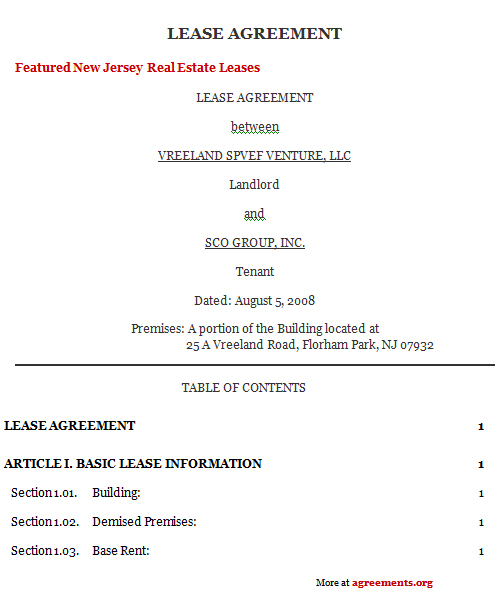Introduction to New Jersey Lease Agreement
New Jersey Lease Agreement is governed by New Jersey State Laws. The Agreement comes into effect after both parties have signed the agreement and after giving due consideration to the term mentioned in the agreement.
Parties Involved in New Jersey Lease Agreement
Under the New Jersey Lease Agreement, the following parties are involved:
- Landlord: The Landlord is the owner of the property. He is the one who has title over the property. He allows a month to month Lease Agreement to tenants to enjoy the property or take benefits. In return for this, the tenant is supposed to pay a pre-determined rent to the Landlord.
- Tenant: A Tenant is a person to whom property is leased out and who is supposed to pay a specified rent.
Purpose of New Jersey Lease Agreement
The Lease Agreement is prepared to keep the following purpose in mind:
- The Lease Agreement helps in availing benefit by those who are not financially capable of incurring such huge capital expenditures.
- A Lease agreement also specifies the conditions to which rights and responsibilities of the parties are subjected to. If these rights are breached, the parties may claim damages.
Contents of the New Jersey Lease Agreement
A well-drafted NJ Lease Agreement should include the following things:
- Name of all the Tenants: The Lease Agreement should provide complete details of all the tenants to the agreement.
- Term of Tenancy: The Lease agreement should clearly state the period for which the lease was valid and also about the renewal of the lease. It should provide that the lease is for a monthly basis or yearly basis. The beginning and the end of the lease period should also be clearly stated in the lease agreement. This helps in preventing further loss to the parties.
- Rent: The lease agreement should also specify the rent to be paid. It should also provide as to when the rent becomes payable or whether any grace period is allowed in payment of rent. The Agreement should also specify the mode of payment of rent.
- Late Fee and Bounced Check: The New Jersey landlord-tenant law also provides for a period of grace for five days in case the landlord is charging any extra fee for delay in payment of rent or for any check with respect to rent that is bounced.
- Security Deposits: The NJ Lease Agreement should also lay down the security deposit needed to be submitted beforehand and the situations in which the security deposits shall be forfeited or the interest to be deducted from security deposits.
- Repairs and Maintenance: The Lease Agreement should also provide for the tenants’ duty to maintain the leased out property and repair the damages that have been done over the course of use.
How to Draft New Jersey Lease Agreement?- Points to Be Considered
Following points needs to be considered while drafting a New Jersey Lease Agreement:
- Identification of Parties: The Lease Agreement should contain the proper name and address of the parties to the agreement. It should provide complete information about the parties to the Lease Agreement.
- Term of Lease: The Lease Agreement should also provide the required date for commencement and termination of the lease. It should also specify the situation for the pre-termination of the lease.
- Leased Property: The Lease Agreement should provide complete details about the property, which is to be leased.
- Mode of Rent Payment: The mode of Payment of rent needs to be specified beforehand only in order to avoid future conflict. The lease agreement should also state any special condition with respect to rent payment.
Benefits and Drawbacks of New Jersey Lease Agreement
Following are the advantages of entering into a Lease Agreement:
- Certain and clear: The Lease Agreement is for a certain period of time and is clear in deciding the rights and duties of the parties. It gives a clear idea to the parties about the period for which such lease is valid.
- Low Capital Expenditure: The Lease Agreement helps in availing the benefits of property at a lesser expense, which involves huge costs when purchased.
Following are the Disadvantages of entering into a Lease Agreement:
- Binding: The Lease Agreement binds the tenant to the premise for a specified time, which may not be in the interest of the tenant.
- Expensive: The landlord may seize the entire security deposit or may evict the tenant before the termination of the lease, which will affect the tenant and turn out to be an expensive affair for him.
What Happens in Case of Violation?
Following Remedies are available to Landlord in case of violation of Lease Agreement:
- Waiver: The Landlord can decide not to waive off his right and enter the premises as soon as any terms of the agreement is found to be breached.
- Evict Pre-maturely: The Landlord can evict the tenant before the expiry of the lease in case the terms of the agreement are breached.
Following Rights are available to Tenant in case of violation of Lease Agreement:
- Damages: The Tenant can claim damages when the landlord breaches the rights of tenants or terminate the tenancy pre-maturely.
Lease Agreement is beneficial for getting access to the property when the sum required to buy it is not there with the tenant. The tenant can use the property to his/ her benefit and pay only a fixed rate of interest as a consideration, which is comparatively much less than the actual cost of the property.
Sample New Jersey Lease Agreement
A sample of the New Jersey Lease Agreement can be downloaded from below.
